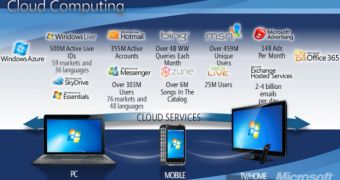Lately, people over at Microsoft Trustworthy Computing have been focused on unveiling various details on what cloud computing means for businesses.
As part of their Cloud Fundamentals Video Series, they discussed various aspects of choosing a cloud services provider, and also focused on other areas of cloud computing, including privacy.
The latest installment of the series comes as a continuation of the video episode released several days ago, which opened the discussion on privacy regarding cloud computing.
The same as the last video in the series, the new clip features Microsoft’s Chief Privacy Officer Brendon Lynch and Tim Rains, director, Trustworthy Computing.
Titled “Cloud Fundamentals Video Series: Cloud Computing Privacy at Microsoft, Part 2,” the video offers info on responsibility, transparency and choice work. These are the three tenets that Microsoft’s approach to cloud computing privacy encompasses.
In the video, you will see Brendon Lynch and Tim Rains using Microsoft’s Office 365 offering as an example to illustrate various aspects of the matter.
“Cloud customers are looking for cloud providers to provide them with information that clearly defines the ways that the cloud provider manages and uses customer data,” Tim Rains explains in a blog post.
“In the case of Office 365, Microsoft provides its customers with the Office 365 Trust Center. The Trust Center gives cloud customers the information they are looking for, in plain language, on exactly how Microsoft handles and uses data gathered in customers’ interactions with Office 365.
“The Trust Center details commitments Microsoft makes to Office 365 customers in six key privacy areas: Data Use Limits; Administrative Access; Geographic Boundaries; Third Parties; Security, Audits, and Certifications; and Regulatory Compliance.”
As stated above, previous videos included in the Cloud Fundamentals Video Series cover other important features of cloud computing, including cloud compliance, e-discovery, collaboration, security, and more.

 14 DAY TRIAL //
14 DAY TRIAL //